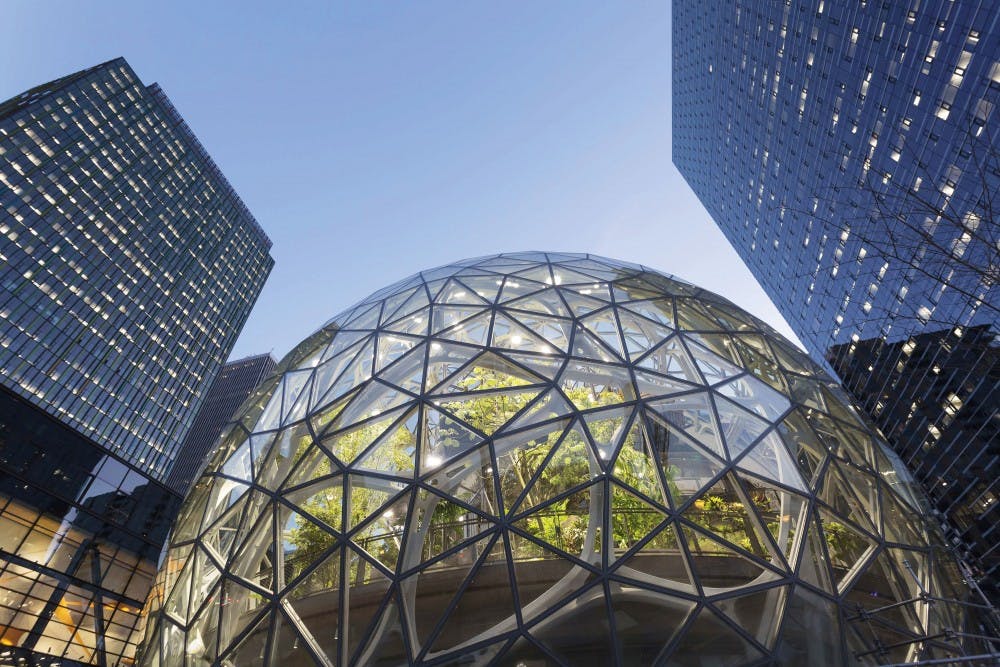Two days. That’s how long it takes a package to ship from Amazon to the buyer’s home.
In two days, a warehouse is bustling with employees who said they are overworked in order to send that package. In two days, the order is shipped by people who don’t feel human — or at least that’s what one Amazon employee said.
In fall of 2013, Gawker.com began reporting on Amazon’s treatment of its workers. The scenarios ranged from employees being overworked and collapsing from heat exhaustion to being fired for crying on the job.
In November 2017, Alan Selby, an investigative reporter for Mirror, went undercover with a hidden camera to try and investigate the way Amazon treats its employees, later writing an article where he said, "'staff are just cattle - there to serve robots.'”
While Selby’s report took place in the United Kingdom, similar occurrences have been reported in Indiana.
Freshman telecommunications and film media major Ebone Rowe quit Amazon after a month of working at a warehouse in Whitestown, Indiana, because she said the management treated her “like a slave.”
“The pay seems good at first and most people are aware that it is hard work, but it’s not until you start working there that you understand just how hard it is,” Rowe said. “You’re working constantly and actually being timed and tracked the whole time.
“If you’re moving too slow, you risk getting fired. If you’re not stowing or picking enough hours within a certain amount of time, you’re also at risk of getting fired. They’re not really fair when it comes to important events in your life where you might have to call off.”
In an Amazon warehouse, the performance of an employee is determined by a point system. Rowe said employees started with six points, and if the employee ran out of points, they were fired. Calling off for other responsibilities, emergencies and other obligations would cause point deductions.
“Calling off causes you to lose points no matter what the situation is,” Rowe said. “I tried to call off for college orientation and it wasn’t excused and I was docked 1 1/2 points.”
Rowe wasn’t the only employee who said Amazon was unfair to their schedule. Bella Bradbury, a freshman integrative studio practice major at Indiana University–Purdue University Indianapolis’ Herron School of Art, said she had permission to change her availability, but later a new manager told her otherwise.
“After I started my classes, however, it became apparent that one day a week I would have trouble getting to class from work,” Bradbury said. “They would not let me leave early anymore. I tried coming in earlier and working different days to make up for this time taken, and then eventually was let go.”
Shevaun Brown, Amazon regional operations PR manager, released a statement on behalf of Amazon addressing its open door policy, which would allow employees to take care of issues at the warehouse.
“Amazon has an open door policy that allows associates to bring their comments, questions and concerns directly to their management teams, including all the way up to our CEO if needed,” Brown said in an email. “We feel we can best address our associate’s needs by encouraging this open door policy in our workplace.”
However, Bradbury said Amazon didn’t have a welcoming atmosphere and it only added to the problems she had with the warehouse.
“The warehouse was brand new, but nothing had color to it,” Bradbury said. “It literally was as if you walked into a prison. It had this really bright lighting too, and it only gave this horror movie kind of feel.
“We had huge fans but no AC. In the summer it was almost unbearable and during the colder months I worked there, you had to wear clothing to fit the weather, which was almost impossible because you’re lifting heavy boxes.”
Temperature was a common complaint among many warehouse workers across the country. According to an article on The Morning Call, an Amazon worker in Pennsylvania reported seeing their co-workers pass out from the heat — a scenario Bradbury said wasn’t uncommon.
“It had been known for people to pass out. Working like that you would just get so hot and although they put water stations in the building, you can’t leave your spot,” Bradbury said. “They encouraged people to drink water and keep cool, but you feel as if you can’t because you’ll end up having to work three times as hard to make up for it.”
Bradbury said the only time workers were able to get a drink of water was during their 15-minute shift break.
“Everyone takes it at the same time and only when the shift manager says it’s time for a break. It honestly felt like absolutely nothing. Your feet still hurt when you go back to work and you even had to be back in position before time ran out,” Bradbury said. “It was practically a ‘use the restroom, get water, smoke if you need it’ break.”
However, Brown said Amazon invested $52 million into air conditioning for all warehouses, and employees have multiple ways to unwind during breaks.
“In all of our fulfillment centers we have breaks that are longer than legally required. In large fulfillment centers we have decentralized break rooms, which mean that for shorter breaks employees do not need to travel long distances to reach a break rooms area,” Brown said. “In these areas we have seating and vending machines; many provide leisure activities such as multiple flat screen TVs, internet access stations, table top soccer, billiard tables, etc.”
Additionally, Brown said many benefits come with working for Amazon, ranging from higher pay to programs to help employees with their future careers.
“We’re proud that our fulfillment center employees earn, on average, 30 percent more than traditional retail employees and receive comprehensive benefits package starting on day one, including healthcare, vision, dental, 401(k) and company stock awards,” Brown said. “Amazon also offers full-time employees innovative programs like Career Choice, where the company will pre-pay up to 95 percent of tuition for courses related to in-demand fields, regardless of whether the skills are relevant to a career at Amazon.”
Rowe, Bradbury and other Amazon employees have said life in the warehouse was full of hard work from the beginning of the shift until the end.
“No one really takes the time to get to know you. It’s as if they would rather have robots they can turn on and off rather than humans who complain about things,” Bradbury said. “The managers don’t really communicate unless they’re telling you what to do, and that really makes you feel like less than human.”
However, the warehouse wasn’t the only place where workers said they felt dehumanized.
“We really are disposable employees,” said Michael Canner, an Amazon Flex [delivery] driver. “Flex drivers are extremely disposable and you feel that way. They will fire you over things you can’t control like packages going missing from door steps. We even take pictures of the packages, but when you talk to support they tell you that those are not used to determine whether the package was delivered.”
Canner said Flex drivers are a lot like contractors. They have no boss to answer to and they choose the work they want through an app. Each delivery block consists of a timeframe, a route and the pay. Each has a different pay for varying amounts of time, so the Flex drivers can choose which delivery block would be best for them to take.
However, Canner said sometimes a block doesn't go as planned.
“I was once given a three hour that took six to complete. I also have been given routes in other towns that took a lot of time. This is rare though, and most of the time I get done ahead of time. It balances out,” Canner said.
Canner said one of the main issues he had with Amazon didn’t come from blocks being inaccurate — it came from a lack of blocks.
“Amazon hired a lot more Flex drivers for the holidays, which cut us down on work that would be available to spread around. Then, they partnered with more van companies and took at least half of the available deliveries from us,” Canner said. “So, where I was able to get at least a block a day or more, now I can barely get a few a week. A lot of people depended on this as their job and Amazon totally, for lack of a better term, screwed us.
“Amazon is great at taking care of customers, but they will absolutely sacrifice you as an employee to show that.”
Some employees, like Andie McKeighan, recalled a different experience. McKeighan said at her warehouse on the north side of Indianapolis, the managers do more than communicate — they give her incentives and other perks despite an intense workload.
“This year I won a gift card for being the most productive person on my shift within an hour. It’s a great place to work if you want to be proud of what you do,” McKeighan said. “It can be crazy around peak, which is pretty much all of the holiday season, but that’s to be expected anywhere.
"Even then, [the management is] always bringing us pizza and dinner and all sorts of other stuff.”
McKeighan said she was aware of negative employee reviews, but believed her positive experience was because of her warehouse.
“I think it has to do with the specific warehouse I’m at. It’s new and extremely small compared to other warehouses, so any complaints that people have are addressed quickly and taken care of,” McKeighan said.
Despite employees expressing feeling inhuman, an Amazon customer can still expect to see their package two days after they make a purchase.
Contact Elena Stidham with comments at emfloyd2@bsu.edu or on Twitter at @ElenaStidham.





